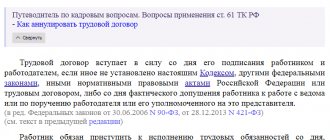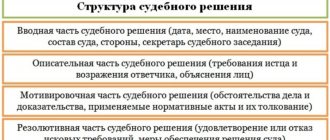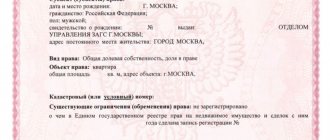1. Court decisions shall enter into legal force after the expiration of the period for appeal, if they have not been appealed. If an appeal is filed, the court decision shall enter into legal force after the court has considered this complaint, unless the appealed court decision is cancelled. If the ruling of the appellate court cancels or changes the decision of the first instance court and a new decision is made, it comes into force immediately. 2. After the court decision has entered into legal force, the parties, other persons participating in the case, and their legal successors cannot again file the same claims in court, on the same basis, or challenge the facts and legal relations established by the court in another civil proceeding.
3. If, after the entry into force of a court decision on the basis of which periodic payments are collected from the defendant, circumstances affecting the determination of the amount of payments or their duration change, each party, by filing a new claim, has the right to demand a change in the amount and timing of payments.
Attention!
The moment the decision enters into legal force is determined uniformly for decisions of all courts of general jurisdiction. The decision comes into force upon the expiration of the period for appeal, if it has not been appealed. The period for appealing a court decision on appeal, as a general rule, is one month from the date of the court decision in its final form, i.e. motivated decision. The civil procedural law may establish exceptions in the form of reduced deadlines for filing appeals and filing court decisions in certain categories of cases.
When filing an appeal against a court decision, it comes into force after consideration of this complaint, unless the appealed decision of the judge is cancelled. In the event that a court decision is canceled or changed by an appeal ruling and a new decision is made, it enters into legal force immediately.
The court decision is executed after it enters into legal force.
At the same time, there are cases when the decision of the court of first instance is subject to immediate execution.
The court is obliged to enforce the decision immediately:
- on the collection of maintenance funds in the form of alimony payments;
— payment of wages to the employee;
- reinstatement at work;
— inclusion of a citizen of the Russian Federation in the list of voters, referendum participants.
The court also has the right to apply the court decision to immediate execution if a party (claimant) files an application indicating the need to apply the court decision to immediate execution. In this case, the application must indicate the circumstances under which a delay in the execution of the decision may lead to significant damage to the claimant or execution may be impossible.
In practice, quite often questions arise related to the execution of a court decision on reinstatement at work.
The basis for starting the procedure for reinstating an employee at work is a court decision.
Since decisions on reinstatement at work are subject to immediate execution, before the court decision enters into legal force, the court issues a writ of execution to the recoverer. In this case, the employer is not deprived of the right to appeal this decision before it enters into legal force.
If an appeal is filed, the court decision will enter into legal force after its consideration by the court, unless the appealed decision is cancelled. In any case, the employer is obliged to first reinstate the employee and then appeal the court decision.
The employer can obtain a writ of execution (court decision) from the employee himself or from bailiffs.
In this case, the employer is given the right to first execute the court decision voluntarily. Otherwise it will have to be executed forcibly.
The requirement for reinstatement at work is considered fulfilled from the moment when two actions are carried out: the reinstated employee began to perform his previous job duties and the order to dismiss him was cancelled.
Thus, the employee must be reinstated at work on the next working day after the court makes the relevant decision, that is, in fact, before the court decision comes into force. And this rule must be observed regardless of whether the employer intends to appeal this court decision or not.
Commentary Art. 209 Code of Civil Procedure of the Russian Federation. Exclusivity rule
The rule of exclusivity in the form of a general norm is formulated in Part 3 of Art. 209 Code of Civil Procedure of the Russian Federation. Exclusivity should be understood as the inadmissibility (exclusion of the possibility) of initiating, prosecuting and resolving a case by a court on a secondly filed claim, identical to the original one, the dispute regarding which is resolved by a court decision that has entered into legal force.
After the decision has entered into legal force, the court has no right to accept applications from the parties and other persons participating in the case, as well as from their legal successors, to consider claims arising from the same grounds. And erroneously initiated cases are subject to termination (Article 220 of the Code of Civil Procedure of the Russian Federation with commentaries).
Decisions made on claims of persons acting in defense of the rights and interests protected by law of other citizens are binding on the person in whose interests the claim was brought, the case was initiated and the case was considered.
When should the money be transferred to you according to the writ of execution?
The money must be transferred (or given away) within a reasonable time. But how long to wait?
One month until the decision comes into force, and another 5-14 days until the writ of execution is prepared.
Since the defendant found out how much he owes you at the last meeting, this should be enough time for calculations.
If the money has not been received, then you need to start collecting the debt under the writ of execution. Act immediately as soon as you receive the document.
The scope of the court decision under Article 209 of the Code of Civil Procedure of the Russian Federation
The validity of the decision is not unlimited. It has objective and subjective limits and does not apply to persons who did not participate in the case, or to facts and legal relations that were not the subject of consideration.
The question of the objective limits of the legal force of a judicial decision is closely related to the subjective limits of the legal force of the decision. The court's conclusions about the legal relationship and legal facts in one decision have prejudicial significance for the decision in another case only in relation to the persons in respect of whom this conclusion was made and who participated in the previously considered case.
The objective limits of the legal force of a court decision are that the effect of the court decision extends only to the substantive legal requirement that was the subject of the court's consideration. The court's judgments expressed regarding legal facts and controversial legal relations in a decision that has entered into legal force enter into legal force as part of the decision as a whole.
The subjective limits of the legal force of a court decision mean that legal force extends to persons legally interested in the outcome of the case, in the court decision, only on the condition that these persons were involved in the case or entered into the process on their own initiative. The legal force of a court decision also extends to the legal successors of these persons.
The subjective limits of the legal force of a court decision, therefore, apply to the parties and third parties who make independent claims regarding the subject of the dispute (see commentary to Article 42 of the Code of Civil Procedure of the Russian Federation), both to the proper and improper party in the event of their simultaneous participation in the process. As for third parties who do not make independent claims regarding the subject of the dispute, the legal force of the decision does not apply to them.
What will be the date of entry into force of a court decision if it is made in absentia?
For civil cases where a verdict is passed without one or more participants, special conditions are provided for recognizing it as having entered into force. The time the defendant receives a copy of it will affect when the district court's decision comes into force. From this moment on, he has the right to apply within 7 days to cancel the decision, and in case of refusal, he has another 30 days to submit an application to the appellate body. In such a situation, you can also ask for an extension of time to file a complaint if there are serious grounds for this (and you can prove them with documents and with the help of witness testimony).
What to do if you missed the deadline to submit a court order
It is difficult to imagine that the claimant will forget to submit an order for execution within 3 years. But sometimes unforeseen life circumstances arise, due to which such a long time may not be enough to transfer a court order to the FSSP. In this case, the claimant can go to court and file a petition to restore the deadline.
Recovering a missed deadline is not always easy. The judge must provide significant evidence confirming the valid reasons for the absence. If we were talking about a period of several weeks or months, then it would be easier to prove the validity of the reasons.
However, for recovery you can refer to:
- for a long stay in the hospital, which prevented active collection efforts;
- to stay abroad, including on the staff of government agencies;
- to be part of units of the Armed Forces of the Russian Federation performing combat missions abroad. This fact is usually the most difficult to prove.
The period for presenting a court order for execution is 3 years.
If the order is issued for requirements for periodic payments, then it can be presented for execution within the period specified by the court or law. Bailiffs are given 2 months to execute the court order. But this is a suspended sentence for mandatory enforcement actions. The actual collection period may be much longer.
There is no exact list of extenuating circumstances under which missed deadlines can be restored. In each case, the judge will evaluate the evidence presented and the claimant's arguments individually. We recommend that you act only with the support of a lawyer to get a chance to restore the statute of limitations.
Comments on Article 209 of the Code of Civil Procedure of the Russian Federation. Properties of court decisions
The property of prejudice (prejudgment) is closely related to exclusivity. Part 2 Art. 209 of the Code of Civil Procedure of the Russian Federation establishes a general rule by virtue of which, after the decision has entered into legal force, the parties and other persons participating in the case cannot again challenge the facts or legal relations established by the court in another proceeding.
In practice, most often we are talking about the prejudice of a court decision made on a claim for recognition to a court decision on a claim for award. Thus, recognition by a court decision of a citizen as the father of a child prevents him from challenging paternity in another process, for example, in a claim for the recovery of alimony from him.
Enforceability is an important property of the legal force of a judicial decision. It means the possibility of enforcement of a court decision. By virtue of Article 210 of the Code of Civil Procedure of the Russian Federation, the decision is executed after it enters into legal force, except in cases of immediate execution. If the claim for award is successful, the plaintiff may seek enforcement of the judgment.
The property of enforceability is inherent in decisions on claims for award. Decisions on claims for recognition are not grounds for issuing a writ of execution and do not require enforcement. Based on a claim for recognition, a claim for award may be brought. In this case, the claim for recognition is prejudicial to the claim for award.
How to delay the entry into force of a court decision
Having understood the time frame provided by law, it becomes obvious that dissatisfied participants have several tools to delay the acquisition of legal status by the decision:
- filing a short appeal form first;
- filing a complaint as late as possible;
- please extend the submission deadline for a valid reason.
If, after all, the decision has acquired legal force, but you do not agree with it and are ready to continue to prove that you are right, then you need to contact the cassation authorities.
What to do after receiving a court decision?
Having received a copy of the document, the plaintiff must write an application for the issuance of a writ of execution if the dispute was about the collection of compensation, penalties, alimony, and other monetary obligations.
The sheet is issued no later than the day following the date of acquisition of legal force. In some cases, it is issued immediately. Subsequently, the sheet is presented for execution to the FSSP or to the employer at the place of employment of the defendant, who owes money.
In some cases, a copy is sufficient for presentation to government agencies:
| Subject of dispute | Where is it provided? |
| Rosreestr, MFC |
| Marriage registry |
| Recognition of complete incapacity or limited legal capacity | Child protection |
| Inheritance cases | Notary, Rosreestr |
| Loan disputes | Financial institutions |
| Insurance disputes | Insurance companies |






